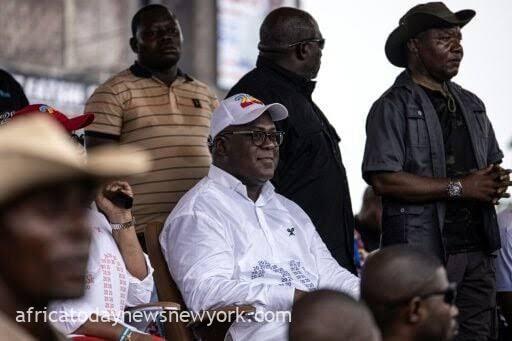Incumbent president Felix Tshisekedi of DR Congo is anticipated to be declared the winner in the recent elections on Sunday, a result already rejected by opposition leaders as a “sham.”
Preliminary results, unveiled thus far, strongly suggest Tshisekedi’s victory in the single-round presidential election, with the National Independent Electoral Commission (Ceni) scheduled to announce provisional totals on Sunday afternoon.
At 60 years old, Tshisekedi has held power since January 2019 and is seeking a second five-year term. As of Saturday evening, with 17.8 million votes counted, he maintains a leading position with 72 percent.
Moise Katumbi, a businessman and former governor of Katanga province in the south-east, claimed the second spot with 18.9 percent.
Next in line, Martin Fayulu, who claims he was cheated in the 2018 presidential election, secured 5.5 percent, while former prime minister Adolphe Muzito had 1.36 percent.
The 20 remaining candidates, including Denis Mukwege, who won a Nobel Peace Price for his work with female victims of wartime sexual violence, were all under one percent.
“We will never accept this sham of an election” and “organised fraud”, Fayulu said last week, as police prevented a protest against the results.
‘Tshisekedi’s vote tally is way beyond all expectations,’ said Tresor Kibangula, a political analyst at the Ebuteli research institute.
‘His dynamic campaign worked’ but his scores in some regions ‘raise questions about the impact of the irregularities that were observed’.
Read also: DR Congo Ban Protests Against Election ‘Irregularities’
Nearly half of the enormous country’s 100 million population, precisely 44 million people, were registered to vote on December 20. The electoral choices encompassed decisions for president, national and regional lawmakers, and municipal councillors.
Originally set for December 20, the voting period was officially prolonged by an additional day to address issues. Moreover, it persisted for several days in remote regions, as reported by observers.
An observation mission jointly led by Catholic and Protestant groups stated that it had “recorded numerous instances of irregularities that could have compromised the integrity of the vote.”
Around 15 embassies have come together to advocate for “restraint” in the impoverished yet mineral-rich country, where post-election tensions have been frequent.
Steps have been initiated by authorities to forestall any turmoil, particularly focusing on the mining zones in the southeast, recognized as Katumbi’s power base.
Stressing a crucial procedural detail, they assert that all electoral conflicts must be channeled to the Constitutional Court, which is anticipated to deliver the definitive results by January 10.
Opposition leaders cast doubt on both the court and Ceni, maintaining that the electoral commission is under the government’s influence.
